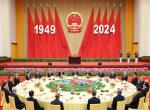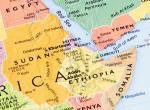Top Priorities
The 74th Session of the UN General Assembly (UNGA) will be held from mid-September 2019 till mid-September 2020. The African Group’s candidate Professor Tijjani Muhammad-Bande of Nigeria, a political scientist, educationist and career diplomat, has been unanimously elected President of this session of the UNGA, which will commemorate the 75th anniversary of the signing of the UN Charter on 26 June 2020.
The six top priorities of the 74th UNGA under its new President will be “peace and security, poverty eradication, zero hunger, quality education, climate action and inclusion.” Different stakeholders will be approached, including the private sector, to implement these priorities by promoting partnerships. Committed to gender parity, the new President is expected to focus on promoting human rights and empowering women and youth during his term.
The first month of the 74th UNGA Session will witness a flurry of high-level meetings on sustainable development, climate change, financing for development as well as implementation of the priorities of the Small Island Developing Countries (SIDS). In addition to these issues, the incoming President has identified reforms of the UN Security Council (UNSC) as a priority to respond to global challenges, including terrorism.
Following his political party’s massive electoral victory in India’s May 2019 general elections India’s Prime Minister Narendra Modi is scheduled to address the 74th Session of the UNGA on 28 September 2019, after a gap of three years. How do the priorities of the incoming President of the UNGA dovetail with India’s core interests in the UNGA’s agenda?
Upholding International Cooperation
In recent months, India has had to bear the brunt of dealing with the impact of unilateral measures such as U.S. domestic legislation imposing economic sanctions against Russia and Iran on multilateral principles of international cooperation upheld by the United Nations. Similarly, the unilateral super-imposition of a major global connectivity paradigm like Belt and Road Initiative (BRI, OBOR) by China, another permanent member of the UNSC, without consultations within the UNGA poses another kind of challenge for India’s strategic interests. As a country which already depends on her international trade for 40 percent of her GDP, India’s self-interest in preserving effective international cooperation as the core principle of multilateral relations is apparent. In this context, the 74th UNGA Session provides India with a platform to unequivocally uphold the importance of international cooperation over unilateral measures.
Reforming the UN Security Council
India will be elected a non-permanent member of the UNSC for 2021-2022 term in elections to be held in the 74th UNGA in June 2020. The absence of India from permanent membership of the UNSC has an adverse impact on India’s core national interests. As China’s misuse of the UNSC during the recent meeting of that body on the “India-Pakistan Question” demonstrated, India was forced to depend on others within the Council to counter China’s strong views during the “closed” meeting. As an incoming member of the UNSC, India will need to create the conditions to ensure that her voice will be heard and taken cognizance of when the UNSC takes decisions. This requires India to prioritize an early conclusion to the on-going Inter-Governmental Negotiations on UNSC reforms in the UNGA during the 74th Session.
Countering Terrorism
The objective of having the UNGA adopt a Comprehensive Convention on International Terrorism (CCIT) has been repeatedly raised by Prime Minister Modi during his addresses to the UNGA earlier. The core obligation that the CCIT would place on member-states is the principle of either prosecuting or extraditing for prosecution alleged terrorists in their jurisdiction. This year, during the 74th UNGA Session, the opportunity to move this proposal would present itself between 7 October-14 November at the meetings of the UNGA’s Legal Committee in New York.
Implementing Agenda 2030
World leaders had agreed in September 2015 when unanimously adopting the UN’s Agenda 2030 on Sustainable Development that “there can be no sustainable development without peace and no peace without sustainable development”. Most of the priorities outlined by the incoming President of the UNGA, viz. poverty eradication, zero hunger, quality education and inclusiveness, are all separately reflected as Sustainable Development Goals (SDGs) in Agenda 2030. Prime Minister Modi’s election campaign slogan of Sabka Saath, Sabka Vikas, Sabka Vishwas highlighted India’s commitment to inclusive and responsible national development goals. The government of India’s think-tank, NITI Aayog, chaired by Prime Minister Modi, represents India at the annual review of the implementation of Agenda 2030.
During the 74th UNGA Session, the meeting of the High-Level Political Forum (HLPF) in July 2020 will focus on the state of implementation of Agenda 2030 five years after its adoption. An important issue flagged by India in her national implementation of Agenda 2030 has been the “lack in uniform statistical systems” within the country, which have created gaps in data used for monitoring progress. The need for reliable statistical data is felt by many other UNGA member-states. India should lead the HLPF to study how to rectify and reflect this issue when assessing the implementation of the SDGs by member-states.
During the 74th UNGA, India should take two major initiatives to focus on areas in Agenda 2030 that will catalyze her transformation: integrate ongoing work on implementing SDG 14 into her SAGAR policy, and create a platform to focus on transfer of appropriate technologies for sustainable development.
India’s Maritime Policies and SDG 14(Oceans)
The HLPF is supposed to ensure that member-states make progress on all 17 SDGs, with no SDG “left behind”. This is essential for meeting the over-arching goal of Agenda 2030, which is SDG 1 on the “eradication of poverty”. Implementation of some of the SDGs, like SDG 14 on Life below Water (or the Oceans), is already being fast-tracked through the UN system. The path-breaking Ocean Conference of June 2017 at the UN headquarters will be followed up by a High-Level UN Conference to support the implementation of SDG 14, to be held between 2-6 June 2020 in Portugal (the home state of current UN Secretary General Antonio Guterres), with Kenya being its co-host. The UN Secretary General has appointed senior Chinese diplomat Liu Zhenmin, who heads the UN’s Economic and Social Affairs pillar, as the Conference Secretary General. A declaration on science-based and innovative areas of action is expected to be adopted by this Conference.
The June 2020 Ocean Conference in Portugal will focus on the Blue Economy as one of its nine core areas This provides India with an opportunity to create a global platform for implementing the concept of the Blue Economy, which is an integral part of India’s Security and Growth for All in the Region or SAGAR policy for the Indian Ocean, unveiled by Prime Minister Modi in March 2015. The “Blue Economy”, which will generate employment, innovation and resources will play a critical role in the transformation of India.
A UN Conference on Technology for Sustainable Development
India has been among the most active member-states during negotiations on sustainable development at the UN to call for the application of appropriate technologies to accelerate development. With her rich experience in using indigenous technologies for sustainable development, and her ability in using emerging cyber technologies to accelerate development through Digital India, India is well placed to put focus on transfer of technologies as a means of implementation to achieve the goals of Agenda 2030. One way for India to focus world attention on this issue is to propose for the UN to host a High-Level Conference on Technology for Sustainable Development during its 75th Session beginning from September 2020. This proposal could be dovetailed with the outcome document of the UN Secretary General’s High-Level Panel on Digital Cooperation issued in June 2019.
Climate Action
Climate action is one area where India has taken a pro-active stand since 2015, both in the negotiations of the SDGs (where India’s initiative on an International Yoga Day was aligned with SDG 3 on global health) and in the framework of the UN Framework Convention on Climate Change Conference in Paris. The proposal co-sponsored by India and France at the Paris Conference for the creation of an International Solar Alliance has been implemented within a relatively short period (from its proposal in November 2015 to the meeting of its first Assembly in New Delhi in October 2018). As Prime Minister Modi noted when inaugurating the Assembly, “nature is now indicating that options such as solar, wind and water, offer more sustainable energy solutions…in the future, when people talk of organizations for the welfare of mankind established in the 21st century, the International Solar Alliance will be at the top of the list…as a great forum to work towards ensuring climate justice.” Apart from these path-breaking initiatives, India is expected to follow up on discussions at the G-20 meeting held in Osaka (Japan) in June 2019 on launching a “coalition for disaster resilient infrastructure”.
Intellectual Cooperation to Sustain Peace and Development
Faced with a multilateral system impacted by increasing confrontation between the major powers, India should take the lead in creating a platform for dialogue under the incoming President of the 74th UNGA. Almost a hundred years ago, the League of Nations had created an International Committee for Intellectual Cooperation in 1922. Headquartered in Paris and supported by France, the Committee brought together eminent intellectuals from different countries to explore how to sustain peace and encourage cooperation. India was represented by Dr Sarvepalli Radhakrishnan (who became the second President of India subsequently) for several years in the Committee, which was mainly responsible for the creation of the UN Educational, Scientific and Cultural Organization in Paris in 1946. Dr Radhakrishnan’s singular contribution was to stress the unity of mankind. Today, this unity is threatened more than ever before by major global challenges.
As an educationist, the new President of the General Assembly should be supportive of creating such a platform to bring together eminent intellectuals from member-states to provide a network for supporting international cooperation as a realistic and sustainable solution to great power confrontation. This initiative could be launched at the International Day of Non-violence on 2 October 2019 at the UNGA.
Memorial to UN Peacekeepers
Earlier this year, India unveiled her National War Memorial in the heart of New Delhi. During the 74th UNGA, it should be a priority for India to implement the UNGA’s 2016 decision to construct a Memorial Wall in honour of the almost 4000 troops from UN member-states, including 169 from India, who have given their lives as UN peacekeepers, in increasingly difficult and violent conflicts across the continents. As Prime Minister Modi had declared on 28 September 2015 at the Leaders’ Summit on Peacekeeping, “I would like to pay homage to the peacekeepers who have laid down their lives in defending the highest ideals of the United Nations. It would be most fitting if the proposed memorial wall to the fallen peacekeepers is created quickly. India stands ready to contribute, including financially, to this objective.”
(The paper is the author’s individual scholastic articulation. The author certifies that the article/paper is original in content, unpublished and it has not been submitted for publication/web upload elsewhere, and that the facts and figures quoted are duly referenced, as needed, and are believed to be correct). (The paper does not necessarily represent the organisational stance... More >>
Image Source: http://issmun.weebly.com/uploads/7/4/2/4/74242533/unga-logo.jpg











Post new comment